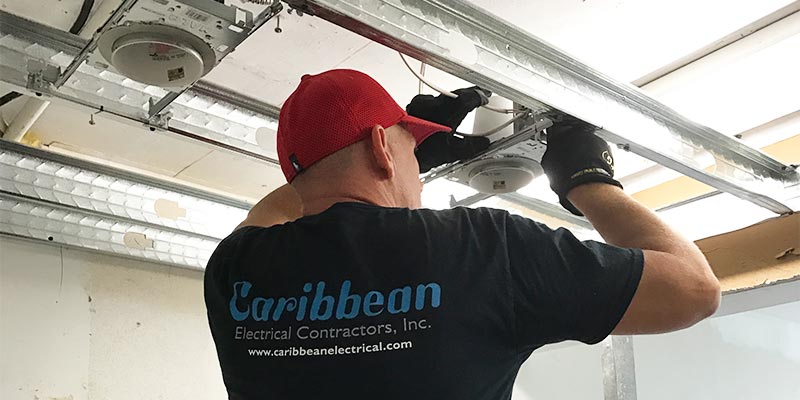
For residences and businesses, electrical code violations cost money, time, and possibly lives. A failed code inspection may lead to expensive rush repairs and possible fines. Violations that are not discovered prior to an incident can lead to fires, injuries, and even deaths. Property owners must keep electrical systems in safe working order — this is why the electrical code exists.
If you've had an inspection by a code authority and they've told you that you must bring items up to code we can help you maintain your property's value and safety by fixing any electrical problems. Please contact us as soon as possible. We can bring your electrical system back up to code.
Signs of Potential Electrical Code Violations
Standard Circuit Breakers
Standard circuit breakers are great at protecting wiring and equipment — which is why you'll find them in use for refrigerators, dryers and other appliances. Standard circuit breakers are not so good at protecting people, so many applications use another type of breaker.
Ground Fault Circuit Interrupters
Ground fault circuit interrupters (GFCI) protect people in places where electricity and moisture are both present — kitchen sink areas, bathrooms, and outdoors are common locations for GFCIs. If there's any chance for electrical danger from water a GFCI is a must. GFCIs should be easily accessible — not hidden in enclosures.
Grounding and Neutral Wires
All switches should have a neutral wire and ground wires should be grounded properly. Many older buildings were grounded to plumbing pipes, but as older pipes are replaced with PVC it's possible that this grounding is no longer truly grounded!
Electrical Outlets
Ever see a young child start to stick a fork tine into an electrical outlet? If you have then you know the importance of tamper resistant receptacles — and guess what? Those receptacles are included in the electrical code.
Outdoor Receptacle Covers
Outdoor receptacle covers should be bubble type so the receptacle is protected even when an electrical cord is plugged into it. Older flat metal covers don't protect the receptacle when a cord is plugged in, allowing moisture to enter the receptacle. Of course the cover should be moisture resistant and tamper resistant as well.
Crowded Service Panels
An electrical panel jammed into a cubby is a hazard for anyone who has to work with it. Make sure that there is at least a square yard (or meter, if you're the scientific type) open around the panel in all directions and that the panel can be accessed without a ladder.
Extension Cords
Do you have extension cords running across rooms? Across passageways? Extension cords are handy, but are a temporary solution for short term electrical needs when the electric outlet is more than six feet from need. They are tripping and fire hazards. A permanent extension cord in your dwelling is a clear indication that you don't have enough receptacles in the room and may be out of code.
Spliced Wires
Over time, illegal splices may have been made to electrical lines while moving lights or other receptacles. Splices must be made in a junction box in order to be legal. Illegal line splices are a serious violation of electrical code.
Recessed Lights and Attic Insulation
Improperly rated recessed lights are a fire hazard if exposed to attic insulation. Lights should be isolated by three or more inches or replaced by lights that are safe for contact with insulation.
Circuit Breakers
It's important to choose the correct circuit breaker for each application. How many of us know that there is more than one type of circuit breaker, and how do you know what circuit breakers are right for particular applications? Is the circuit breaker for your dryer a good choice for the outlet near the washroom sink?
Arc Fault Circuit Interrupters
Arc fault circuit interrupters (AFCI) help prevent fires caused by pinched or damaged electrical cords. Have you ever seen the damage a pet bunny can do to electrical cords? Pets, wildlife, children and even the simple day to day movement of electrical appliances can lead to damage that can cause fire. The circuits in AFCIs shut down power when an arc is detected on the line. This technology belongs in every outlet that doesn't require a GFCI. It improves the safety of building inhabitants, property inside the building and the building itself. Any circuit breaker that trips frequently indicates a potential hazard and should be inspected and replaced if necessary.
Old Wiring
Older houses may include wiring insulated with fabric and materials that are potential hazards. This insulation breaks down over time, becoming brittle and flaking away from the wire core. Another old style of wiring is called knob and tube. It is made up of ceramic insulators. This type of wiring is a shock and fire hazard and should be replaced with modern wiring capable of handling modern electrical loads safely and efficiently. Exposed and loose wires are another hazard. Electrical arcs and shorts may cause interruptions and service hazards.



